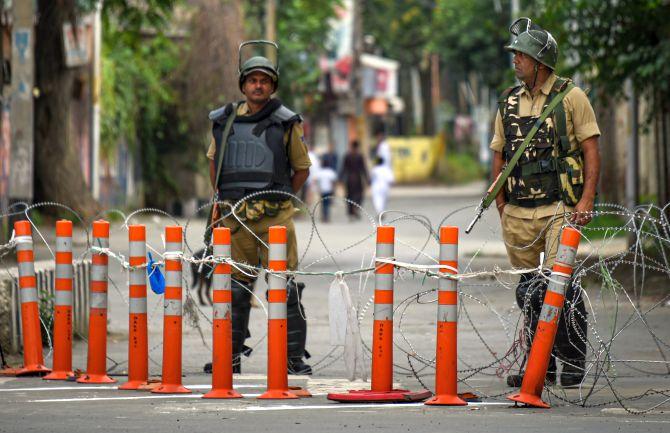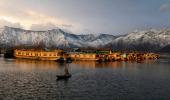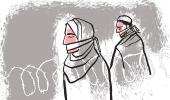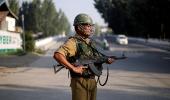This is the first time that a state is being downsized into Union Territories.

As the clock struck 12 and a new day beckoned, Jammu and Kashmir on Thursday transitioned from a state into two Union Territories with a wary Valley shutting down as it has for 88 days and Prime Minister Narendra Modi saying the 'new system' is aimed at 'building a strong link of trust'.
President Ram Nath Kovind revoked President's rule imposed in the restive state, long the centre of global attention, and took over control of the administration of the two new union territories, Jammu and Kashmir, and Ladakh.
This is the first time that a state is being downsized into Union Territories, the two new entities taking the total number of UTs to nine and bringing down the number of states in India to 28.
The move was in accordance with the government's August 5 announcement withdrawing the state's special status under Article 370 and bifurcating the state into union territories.
Girish Chandra Murmu in Jammu and Kashmir and Radha Krishna Mathur in Ladakh stepped into history as the first lieutenant governors of the new union territories.
Jammu and Kashmir High Court Chief Justice Gita Mittal administered the oath of office to the new appointees, first in Leh and then later in the day in Srinagar.
As the changes came into effect, the prime minister was at the Statue of Unity in Kevadiya in Gujarat where he paid glowing tributes to Sardar Vallabhbhai Patel on his 144th birth anniversary and led the 'national unity pledge'.
Defending the abrogation of Article 370, he said the special status provisions only generated terrorism in Jammu and Kashmir.
"The new system in Jammu and Kashmir and Ladakh is not meant to draw a line on the land (to draw a boundary) but to build a strong link of trust," the prime minister said.
In a swipe at Pakistan, he said those 'who cannot win wars' against India are trying to destroy its unity.
"The country took the decision of abrogation of Article 370, which had only given separatism and terrorism to that state," Modi said.
"Patel had once said that had he handled the Kashmir issue, it would not have taken so long to resolve it," Modi said, in a veiled swipe at Jawaharlal Nehru, the country's first prime minister whom the ruling Bharatiya Janata Party often blames for the Kashmir issue.
In the Kashmir Valley, however, it was another day of shutdowns and tension with markets shut, deserted roads and children staying away from school.
"This is a decision against our interests. They have robbed us of our special status and our identity," Muzammil Mohamad, a resident of Srinagar's Civil Lines area said.
Another local, Umer Zargar, said, "Kashmir was a disputed territory and India's decision was illegal, immoral and unconstitutional."
"India cannot abrogate Article 370. This issue is in the United Nations. There are resolutions on it. This decision in illegal, immoral and unconstitutional," he said.
For the third consecutive day, no vendors set up stalls on the TRC Chowk-Lal Chowk road, the officials said.
The roadside vendors, who had regularly set up their stalls over the past two months, have not been turning up for business since Tuesday when a delegation of EU parliamentarians landed for a two-day visit to assess the situation.
Landline and post-paid mobile phone services have been restored across the valley, but all internet services continued to remain suspended since the night of August 4.
Most top-level and second-rung separatist politicians have been taken into preventive custody while mainstream leaders, including two former chief ministers -- Omar Abdullah and Mehbooba Mufti – have been either detained or placed under house arrest.
Lok Sabha MP from Srinagar Farooq Abdullah has been arrested under the controversial Public Safety act, a law enacted by his father and National Conference founder Sheikh Mohammad Abdullah in 1978 when he was the chief minister.
Addressing a gathering in the national capital, Union Home Minister Amit Shah said Article 370 and Article 35A were the gateways of terrorism into Jammu and Kashmir. Modi closed the gateway by repealing them, he said.
Politicians of the Valley also weighed in with their views.
Bharatiya Janata Party's Jammu and Kashmir spokeperson Khalid Jehangir said the move will usher in peace and development in Jammu and Kashmir, and Ladakh.
"This transition is for peace, development and dignity and our prime minister's vision of Jammu and Kashmir on the same lines will be achieved in the coming years with the blessings of the people of this nation," he said.
The National Conference, however, termed the Centre's decision 'unconstitutional' and 'not in the interest of the people of the country'.
"... The only power the Parliament has is to form a new state. Maybe Parliament can chip away a part of a state and create a new state. There is no power to make a state disappear,” NC leader Justice (retd) Hasnain Masoodi told PTI.
With this move, the Constitution of Jammu and Kashmir and the Ranbir Penal Code has ceased to exist.
In a late night notification on Wednesday, the Home Ministry replaced the state of Jammu and Kashmir with the 'Union Territory of Jammu and Kashmir' and announced omission of 'permanent residents or hereditary state subjects'.
The ministry's Jammu and Kashmir division announced a slew of measures, including application of central laws to the state.










